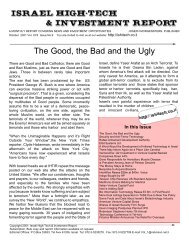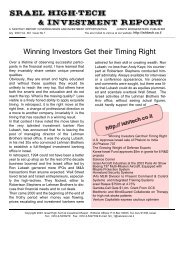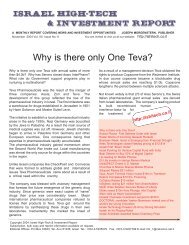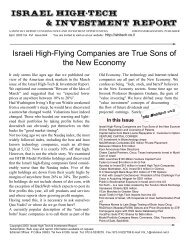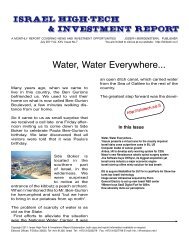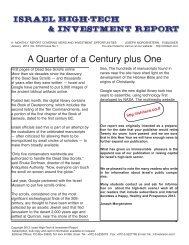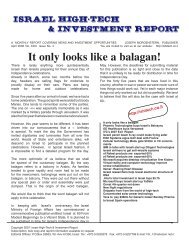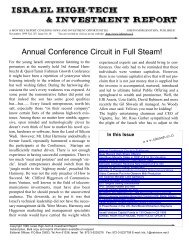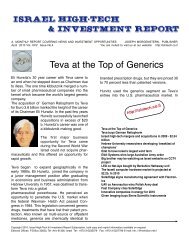Global Linkage - The Israel High Tech & Investment Report
Global Linkage - The Israel High Tech & Investment Report
Global Linkage - The Israel High Tech & Investment Report
Create successful ePaper yourself
Turn your PDF publications into a flip-book with our unique Google optimized e-Paper software.
ings could prove useful to women who are having<br />
trouble getting pregnant. On the other, further<br />
studies might show that certain antioxidants might<br />
be effective means of birth control that could be<br />
safer than today’s hormone-based prevention.”<br />
Dekel and her team are now planning further<br />
studies to investigate the exact mechanics of this<br />
step in ovulation and to examine its effect on mice<br />
when administered in either food or drink. In addition,<br />
they plan to collect data on the possible link<br />
between females being administered antioxidant<br />
supplements and the difficulty to conceive.<br />
From solar to wind energy - <strong>Israel</strong> is open to<br />
ideas<br />
<strong>The</strong> impressive performance by <strong>Israel</strong>i companies<br />
at the Cleantech Open IDEAS competition<br />
confirms the country as a place where people are<br />
open to new ideas and thinking outside the box.<br />
<strong>The</strong> Wind Tulip, fashioned like an environmental<br />
sculpture, is designed so that people will feel<br />
comfortable living next to a high-efficiency, cleanenergy<br />
solution.<br />
<strong>The</strong> Wind Tulip, fashioned like an environmental<br />
sculpture, is designed so that people will feel<br />
comfortable living next to a high-efficiency, cleanenergy<br />
solution.<br />
<strong>Israel</strong>i startups Solaris Synergy and Leviathan<br />
Energy cleaned up at the <strong>Israel</strong> national Cleantech<br />
Open IDEAS competition. Held in November<br />
at Tel Aviv University’s Akirov Institute for Business<br />
and Environment, the event was a feature of<br />
<strong>Global</strong> Entrepreneurship Week.<br />
Solaris took first prize and Leviathan captured<br />
both second and third place for its innovations in<br />
solar and wind energy, respectively. Solaris went<br />
on to rank fourth in a field of national winners from<br />
20 countries at Cleantech Open IDEAS, an international<br />
competition intended as a launching<br />
pad for novel approaches to worldwide energy,<br />
environmental and economic challenges.<br />
Solaris<br />
1<br />
March 2011<br />
In its quest to make solar energy practical and<br />
affordable, the Solaris system overcomes two<br />
major hurdles: <strong>The</strong> large tracts of land needed for<br />
solar farms and the expense of the silicon material<br />
that converts light to electricity.<br />
Yossi Fisher at the company’s prototype Floating<br />
Concentrating Photovoltaic (F-CPV) system.<br />
Solaris’ Floating Concentrating Photovoltaic (F-<br />
CPV) system sits on water rather than on land.<br />
<strong>The</strong>re is a huge amount of inland water in the<br />
world, and many confined bodies of water are<br />
located in areas with excellent solar insulation,<br />
says Fisher. <strong>The</strong> system works best in areas of<br />
strong sunlight, such as Africa, Asia, Australia,<br />
Mediterranean countries and South, Central and<br />
southern North America.<br />
Constructed of lightweight plastic and fiberglass,<br />
the Lego-like modules fit together in grids configured<br />
to fit the shape of the host body of water - be<br />
it fresh-, salt- or wastewater. This solar-on-water<br />
platform doubles as a breathable reservoir cover<br />
that significantly reduces evaporation and eliminates<br />
harmful organic and algae growth. Each<br />
grid can generate 200 kilowatts of power.<br />
<strong>The</strong> modules are faced with a curved mirrored<br />
film that clusters the sunlight into a thin line. Since<br />
only that five percent of the surface needs a silicon<br />
cover, Solaris uses relatively little of the costly<br />
material, explains co-founder and CEO Yossi<br />
Fisher. This has an added environmental benefit<br />
since silicon production releases contaminants<br />
into the air.<br />
Because there is no friction between the grids and<br />
the water, it only takes one small engine to slowly<br />
rotate the grids to keep the light focused on the<br />
line of silicon material.<br />
<strong>Israel</strong>i 2010 Cleantech Open Winner - Solaris<br />
Synergy<br />
Showing a visitor the prototype on the roof of<br />
Solaris headquarters at Har Hotzvim Industrial



